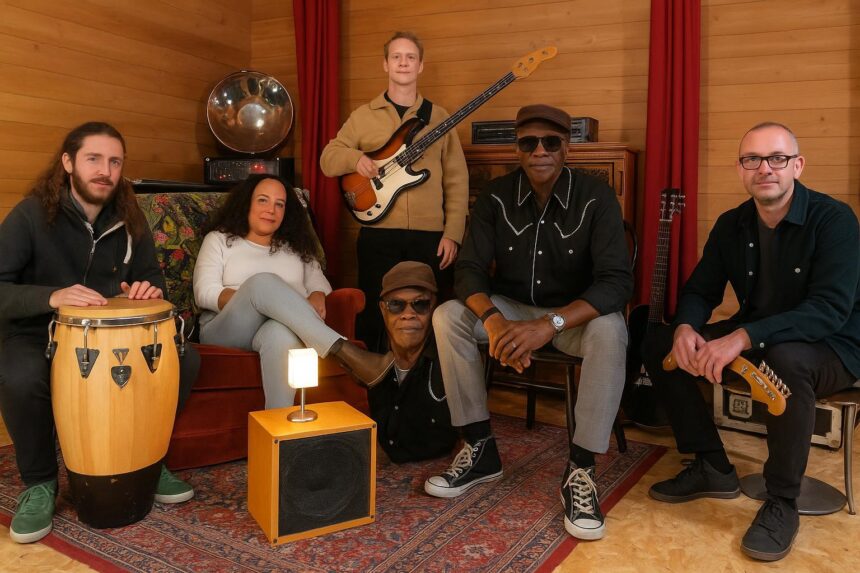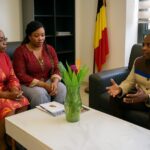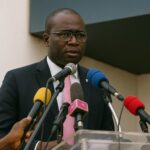Studio session in Tours heats up
On 21 October, the basement of Cyril Solnais’s Ateliers de la Morinerie in Saint-Pierre-des-Corps vibrated to Congolese guitars and reggae skanks. Djoson Philosophe, frontman of Brazzaville’s Super Nkolo Mboka, laid down vocals for “Rumba mokili mobimba” alongside the reggae crew The Ligerians.
The line-up inside the cabin read like a cultural atlas: percussionist Adrien Mbonda, bass player Nico Tumbaco, guitarist Jako Etutu, keyboardist Emaly Loketo and drummer Mathys Minguete. Solnais balanced the mix, seeking a marriage between rumba’s trademark sebene and a laid-back Jamaican groove.
“We want listeners to feel Brazzaville and Kingston in the same heartbeat,” smiled Tumbaco between takes, as the metallic ping of a steel pan floated over the wooden warmth of maracas.
A meeting sparked at Fespam 2023
This Franco-Congolese adventure began last July during the Panafrican Music Festival in Brazzaville (Fespam 2023). Mbonda, known in France with the Pan’n’Co Steelband, had travelled as a craftsman, presenting his handmade steel pans inside the Marché de la musique africaine.
Backstage, he crossed paths with Djoson Philosophe. Both artists shared a desire to push rumba beyond its usual borders without diluting its soul. “I imagined the sound of my pan echoing the sanza of our elders,” Mbonda recalled.
Momentum gained speed in January when the percussionist returned to the Congolese capital for a two-week immersion workshop, capped by a live concert on 25 January. The crowd reaction convinced the pair that a studio recording abroad was the next logical step.
UNESCO label fuels new ambitions
Recognition of Congolese rumba as UNESCO Intangible Cultural Heritage on 14 December 2021 injected fresh pride into the genre (UNESCO). For European musicians, the listing became an invitation. “We felt honoured, almost responsible, to help spread such a treasure,” explained Julien Souchois, co-founder of The Ligerians.
Rumba’s inclusion also opened funding doors. According to Mbonda, several cultural institutes in Loire Valley offered logistical help, making it easier for the Brazzaville singer to secure visas and equipment. “The UNESCO seal shows that rumba belongs to the world,” Djoson added.
That global stance is echoed in the track title itself. In Lingala, “Rumba mokili mobimba” means “Rumba all over the world”, a direct nod to the music’s new diplomatic passport.
Steel pan bridges Congo and Caribbean
The song splices two classics: “Rumba na piste” by Djoson and “Ebandeli ya mosala” by Congo legend Kosmos Moutouari. Over that foundation, Mbonda’s steel pan introduces a tropical shimmer generally found in Trinidad and Tobago’s Carnival streets.
Ethnomusicologist Léonie Mavoungou hears more than novelty. “The steel pan’s bright overtones resonate with the Congolese sanza, creating an ancestral dialogue across the Atlantic,” she said. Such links recall historic migrations that seeded Caribbean rhythms with Central African DNA.
Studio engineer Solnais captured those conversations with vintage ribbon microphones and modern digital plug-ins. Each take ended with wide grins as Congolese licks met dub delays, proof that geography bends when the groove hits right.
What fans can expect next
Filming for the clip used handheld cameras prowling among microphones, letting viewers feel inside the session. Outdoor shoots around the medieval lanes of Tours added European colour to African melodies, with locals spontaneously dancing during takes.
Post-production should wrap in early December, say the producers. Distribution will rely on YouTube, Boomplay and local Brazzaville channels. A joint mini-tour is under discussion, potentially stopping in Pointe-Noire, Paris and Rotterdam.
While waiting, Djoson posts short behind-the-scenes reels on Instagram, already generating thousands of likes. “We’re not just dropping a song,” the singer insists. “We’re sending a piece of Congo’s heart to every continent.”





















